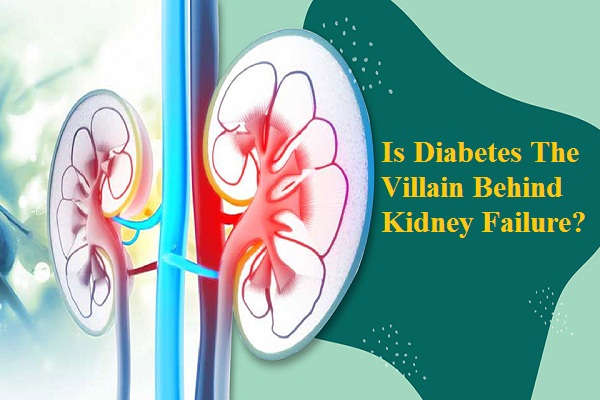
Diabetes is the number one cause of kidney failure in the world. It causes 30-45% of all kidney failures in the world. Among all the complications of diabetes mellitus, kidney failure is the most punishing and many times is the main reason for patients’ death. Not all patients with diabetes run equal risk for developing kidney disease. A combination of environmental and genetic factors determines the progress of diabetes to DKD. And the good thing is it can be prevented when detected early. Sadly most people do not control their diabetes strictly in the initial years of disease. Many others check only their blood sugar and forget to check tests for early detection of kidney disease.
How does Diabetes Affect Kidneys?

Kidneys clean the blood, by eliminating the waste and excess fluid in the form of urine.
All the body parts are affected to varying levels in the body of patients. Some have more heart damage, some kidney, some eyes, etc. Kidney is affected by many different mechanisms. It is not just controlling blood sugar. Once kidney disease starts, the blood pressure starts increasing, the blood sugar many times falls down and you will have hypoglycemia. The diabetes blocks the blood vessels, extracellular materials collects in wrong places and blocks the proper functioning of the kidney.
Who is at Risk?

- Genetic factors have been shown to play a role. Indians, Hispanics and African Americans have a higher predilection to kidney failure if they have uncontrolled diabetes
- Sedentary lifestyle, obesity and high salt diet in a patient with diabetes increases the risk of kidney failure
- Family history of kidney failure and heart failure
How is Kidney failure Diagnosed?
The Indian and American Diabetes Association strongly advices that all patients with diabetes should check urine micro-albumin and serum creatinine to detect kidney disease early. These patients should check this at least once every 6-12 months. Also important is to keep track of the glucose levels by frequently checking your Search Results
Web results HbA1c levels at least once in 4-6 months. HbA1c also should be within 7.5 or lesser and only then we can assume that your blood sugar is well controlled.
To cure, we need to detect early.
Any patient with diabetes and especially the at- risk group, should be aware of the complications and get their kidney function tested regularly.
Albumin is a protein reabsorbed by the kidneys from the blood and as a result should not be found in the urine if the kidneys are functioning normally. Albuminuria which is albumin found in the urine is the test done to check how well your kidneys are filtering. This is the first sign of kidney damage.
Creatinine is eliminated by the kidneys and damaged kidneys will be unable to do so, hence another test is to check the creatinine levels of the blood.
How to Prevent and Treat DKD:
- The most important step to prevent the progress of diabetes to diabetic kidney disease and ultimately kidney failure is to tightly control your blood sugar levels.
- A combination of exercise, diet and anti-hyperglycemic medications decided by your doctor play an important role in preventing DKD. The goal is to keep the HA1C (glycated hemoglobin) levels under 7% in a diabetic patient.
- Blood pressure control by Angiotensin receptor blockers (ARBs)or Angiotensin converting enzyme inhibitors (ACEI) is key in treating DKD and controlling the progress.
- Newer drugs like Dapagliflozin are exceptional apart from ARBs and ACEi in prevention of kidney disease. Please discuss with your doctor.
- Never forget to check your blood pressure at home if you have kidney disease. This simple intervention not only saves your life but also your kidneys.
(Disclaimer: Dr llangovan Veerappan, Nephrologist, NephroPlus Dialysis center, KG Hospital, Tamil Nadu. Views expressed are a personal opinion.)
Be a part of Elets Collaborative Initiatives. Join Us for Upcoming Events and explore business opportunities. Like us on Facebook , connect with us on LinkedIn and follow us on Twitter , Instagram.












